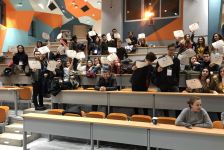
FACULTY OF COMMUNICATION
Department of New Media and Communication
GEHU 210 | Course Introduction and Application Information
| Course Name |
Principles of Social Sciences I
|
|
Code
|
Semester
|
Theory
(hour/week) |
Application/Lab
(hour/week) |
Local Credits
|
ECTS
|
|
GEHU 210
|
Fall/Spring
|
3
|
0
|
3
|
6
|
| Prerequisites |
None
|
|||||
| Course Language |
English
|
|||||
| Course Type |
Service Course
|
|||||
| Course Level |
First Cycle
|
|||||
| Mode of Delivery | - | |||||
| Teaching Methods and Techniques of the Course | - | |||||
| Course Coordinator | ||||||
| Course Lecturer(s) | ||||||
| Assistant(s) | - | |||||
| Course Objectives | |
| Learning Outcomes |
The students who succeeded in this course;
|
| Course Description | In addition to a specific discussion on the nature of scientific knowledge and social sciences, the course will cover selected issues from anthropology, sociology, psychology, social psychology, political science and economics. |
|
|
Core Courses | |
| Major Area Courses | ||
| Supportive Courses | ||
| Media and Management Skills Courses | ||
| Transferable Skill Courses |
WEEKLY SUBJECTS AND RELATED PREPARATION STUDIES
| Week | Subjects | Related Preparation |
| 1 | Presentation and overview of the course | |
| 2 | Social Science & Critical thinking and reading skills for HUM 103 | Social Science: An Introduction to the Study of Society*, Chapter 1 (The additional reading material will be available at blackboard). |
| 3 | Society, Culture and Cultural Change | Social Science: An Introduction to the Study of Society, Chapter 4 |
| 4 | Society, Individual and Social Interaction | Social Science: An Introduction to the Study of Society, Chapter 7 |
| 5 | Social and Economic Stratification | Social Science: An Introduction to the Study of Society, Chapter 11 |
| 6 | MIDTERM | |
| 7 | Movie Screening | |
| 8 | Stratification, Minorities, and Discrimination | Social Science: An Introduction to the Study of Society, Chapter 12 |
| 9 | Politics and Society | Social Science: An Introduction to the Study of Society, Chapter 13 |
| 10 | Ideologies I | Social Science: An Introduction to the Study of Society, Chapter 13 & Micheal Roskin et al, Political Science: An Introduction, Prentice Hall International, 6th ed., 1997, pp. 98-123. |
| 11 | Ideologies II | Social Science: An Introduction to the Study of Society, Chapter 13 & Micheal Roskin et al, Political Science: An Introduction, Prentice Hall International, 6th ed., 1997, pp. 98-123. |
| 12 | Movie screening | |
| 13 | In-class Writing | |
| 14 | Economics and Society | Social Science: An Introduction to the Study of Society, Chapter 16 |
| 15 | Review of the semester | |
| 16 | Final Exam |
| Course Notes/Textbooks | Must readings mentioned in this information sheet. |
| Suggested Readings/Materials |
EVALUATION SYSTEM
| Semester Activities | Number | Weigthing |
| Participation |
16
|
10
|
| Laboratory / Application | ||
| Field Work | ||
| Quizzes / Studio Critiques |
1
|
25
|
| Portfolio | ||
| Homework / Assignments | ||
| Presentation / Jury | ||
| Project | ||
| Seminar / Workshop | ||
| Oral Exams | ||
| Midterm |
1
|
30
|
| Final Exam |
1
|
35
|
| Total |
| Weighting of Semester Activities on the Final Grade |
60
|
|
| Weighting of End-of-Semester Activities on the Final Grade |
40
|
|
| Total |
ECTS / WORKLOAD TABLE
| Semester Activities | Number | Duration (Hours) | Workload |
|---|---|---|---|
| Theoretical Course Hours (Including exam week: 16 x total hours) |
16
|
3
|
48
|
| Laboratory / Application Hours (Including exam week: '.16.' x total hours) |
16
|
0
|
|
| Study Hours Out of Class |
16
|
4
|
64
|
| Field Work |
0
|
||
| Quizzes / Studio Critiques |
1
|
14
|
14
|
| Portfolio |
0
|
||
| Homework / Assignments |
0
|
||
| Presentation / Jury |
0
|
||
| Project |
0
|
||
| Seminar / Workshop |
0
|
||
| Oral Exam |
0
|
||
| Midterms |
1
|
17
|
17
|
| Final Exam |
1
|
22
|
22
|
| Total |
165
|
COURSE LEARNING OUTCOMES AND PROGRAM QUALIFICATIONS RELATIONSHIP
|
#
|
Program Competencies/Outcomes |
* Contribution Level
|
||||
|
1
|
2
|
3
|
4
|
5
|
||
| 1 | To be able to critically discuss and interpret the theories, concepts and ideas that form the basis of the discipline of new media and communication. |
|||||
| 2 | To be able to critically interpret theoretical debates concerning the relations between the forms, agents, and factors that play a role in the field of new media and communication. |
|||||
| 3 | To have the fundamental knowledge and ability to use the technical equipment and software programs required by the new media production processes. |
|||||
| 4 | To be able to gather, scrutinize and scientifically investigate data in the processes of production and distribution. |
|||||
| 5 | To be able to use the acquired theoretical knowledge in practice. |
|||||
| 6 | To be able to take responsibility both individually and as a member of a group to develop solutions to problems encountered in the field of new media and communication. |
|||||
| 7 | To be informed about national, regional, and global issues and problems; to be able to generate problem-solving methods depending on the quality of evidence and research, and to acquire the ability to report the conclusions of those methods to the public. |
|||||
| 8 | To be able to critically discuss and draw on theories, concepts and ideas that form the basis of other disciplines complementing the field of new media and communication studies. |
|||||
| 9 | To be able to develop and use knowledge and skills towards personal and social goals in a lifelong process. |
|||||
| 10 | To be able to apply social, scientific and professional ethical values in the field of new media and communication. |
|||||
| 11 | To be able to collect datain the areas of new media and communication and communicate with colleagues in a foreign language ("European Language Portfolio Global Scale", Level B1). |
|||||
| 12 | To be able to speak a second foreign language at a medium level of fluency efficiently. |
|||||
| 13 | To be able to relate the knowledge accumulated throughout the human history to their field of expertise. |
|||||
*1 Lowest, 2 Low, 3 Average, 4 High, 5 Highest
NEWS |ALL NEWS
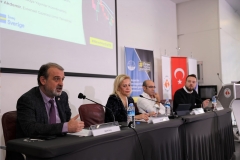
‘Media’ Summit at Izmir University of Economics
International Press Institute (IPI) organized a symposium on ‘Economy and Financial Sustainability of Media’ hosted by Izmir University of Economics (IUE).
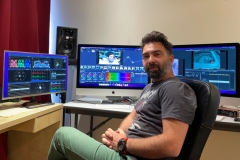
Received a special invitation from the USA for the Italian director's documentary
Dr. Alper Gedik, Lecturer at Department of New Media and Communication, Izmir University of Economics (IUE), went to the USA to introduce
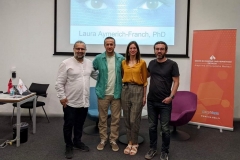
Laura Aymerich-Franch visited our department
Laura Aymerich-Franch who is currently a senior research fellow at Pompeu Fabra University (Barcelona) was a visiting scholar in the Department of

Women and the Media in the Middle East
Assoc. Prof. Dr. Nahed Eltantawy, who will be visiting the Media and Communication Department as a part of the Fulbright Specialist Program,
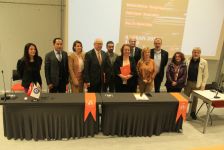
A Partnership Agreement between the Department of Media and Communication and Izmir Journalists Association
“Local Media in Izmir”, a panel organized by the Department of Media and Communication, Izmir University of Economics, was held on Thursday
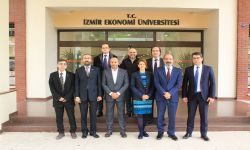
YAYINCILIKTA TELİF HAKLARI İEÜ’DE TARTIŞILDI
İzmir Ekonomi Üniversitesi, “Radyo Televizyon Yayıncılığı ve Telif” konferans ve sergisine ev sahipliği yaptı. İEU İletişim Fakültesi Dekanı Prof. Dr. Ebru Uzunoğlu’nun



